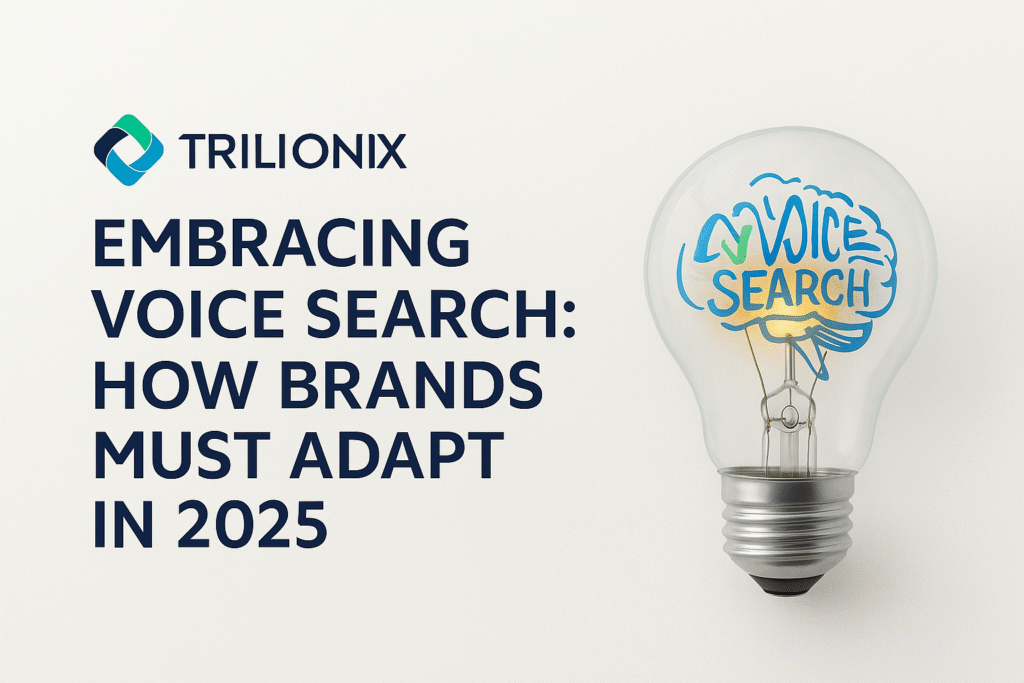The rise of voice assistants like Alexa, Siri, and Google Assistant is reshaping how people search for products, services, and information. It’s not just about typing keywords anymore — people are asking full sentences, questions, and conversational queries. For brands, this shift is more than a trend — it’s a call to adapt and stay relevant.
In this post, we’ll explore why voice search matters in 2025, what changes brands must make, and how Trilionix can help you future-proof your digital presence.
Why Voice Search Is No Longer Optional
- User Behavior Is Shifting
More users now use voice searches on mobile and smart devices for convenience. Many begin a search with “Hey Google…” or “Alexa…”. That means queries are getting longer, more conversational, and context-driven. - Zero-Click & Featured Snippets Dominate
Voice assistants often read out the top result or featured snippet rather than sending users to a webpage. If your content doesn’t rank as a snippet or answer box, you lose visibility. - Local Search & Intent Matter More
A large share of voice searches are for “near me” queries — e.g. “best web designer near me”, “digital agency in Kochi”, etc. Local SEO, schema markup, and content that addresses intent become more crucial. - SEO Rules Are Changing
Instead of focusing only on short keywords, you now need to optimize for natural language queries, question-based headings, and context (e.g. “how to increase website speed” rather than “website speed”).
What Brands Need to Do: Actionable Steps
- Audit & Reformat Content
- Identify common question phrases in your niche (use tools like Answer the Public, Ahrefs, etc.).
- Insert content in FAQ sections, H2/H3 question formats: “How do I choose a digital marketing firm?”
- Use conversational tone in content — write how people speak.
- Focus on Featured Snippets & Structured Data
- Optimize for answer boxes: concise, to-the-point answers at the top of pages.
- Use schema markup (FAQ schema, Q&A, local business markup).
- Ensure mobile-first, fast-loading pages (voice search is mobile-heavy).
- Strengthen Local SEO Signals
- Maintain consistent NAP (Name, Address, Phone) across directories.
- Claim and optimize Google Business Profile / Maps listing.
- Publish localized content (e.g. “Digital marketing trends in Kerala 2025”).
- Leverage Voice-Optimized Advertising & Campaigns
- Use long-tail, conversational keywords in PPC.
- Align ad copy to answer questions (“Need help boosting traffic? We can help.”).
- Consider voice ad formats or audio sponsorship in relevant channels (podcasts, smart devices).
- Track & Iterate
- Use analytics to find voice-based traffic (look at “(not provided)” in mobile search queries, or search console question queries).
- Monitor changes in ranking, CTR, featured snippet inclusion, bounce rates.
- Refine over time — optimization is continuous.
Why Trilionix Is Well-positioned to Help
- Holistic Strategy + Technical Expertise
We don’t just write content — we implement the SEO architecture, schema, and site optimizations needed to win voice search. - Content & UX Synergy
Our designers, writers, and strategists work together to create content that is both conversational and conversion-centric. - Local Experience
Operating in India/Kerala, we deeply understand the local context, user behavior, and opportunity to localize for maximum reach. - Ongoing Support
Voice search is evolving. Our iterative approach means we’ll keep your strategy up-to-date as algorithms and devices change.
Call to Action
Ready to get voice-search optimized? Drop us a message, and we’ll audit one page of your site for voice-readiness — absolutely free. Let’s make sure your brand is heard (literally) in 2025.





